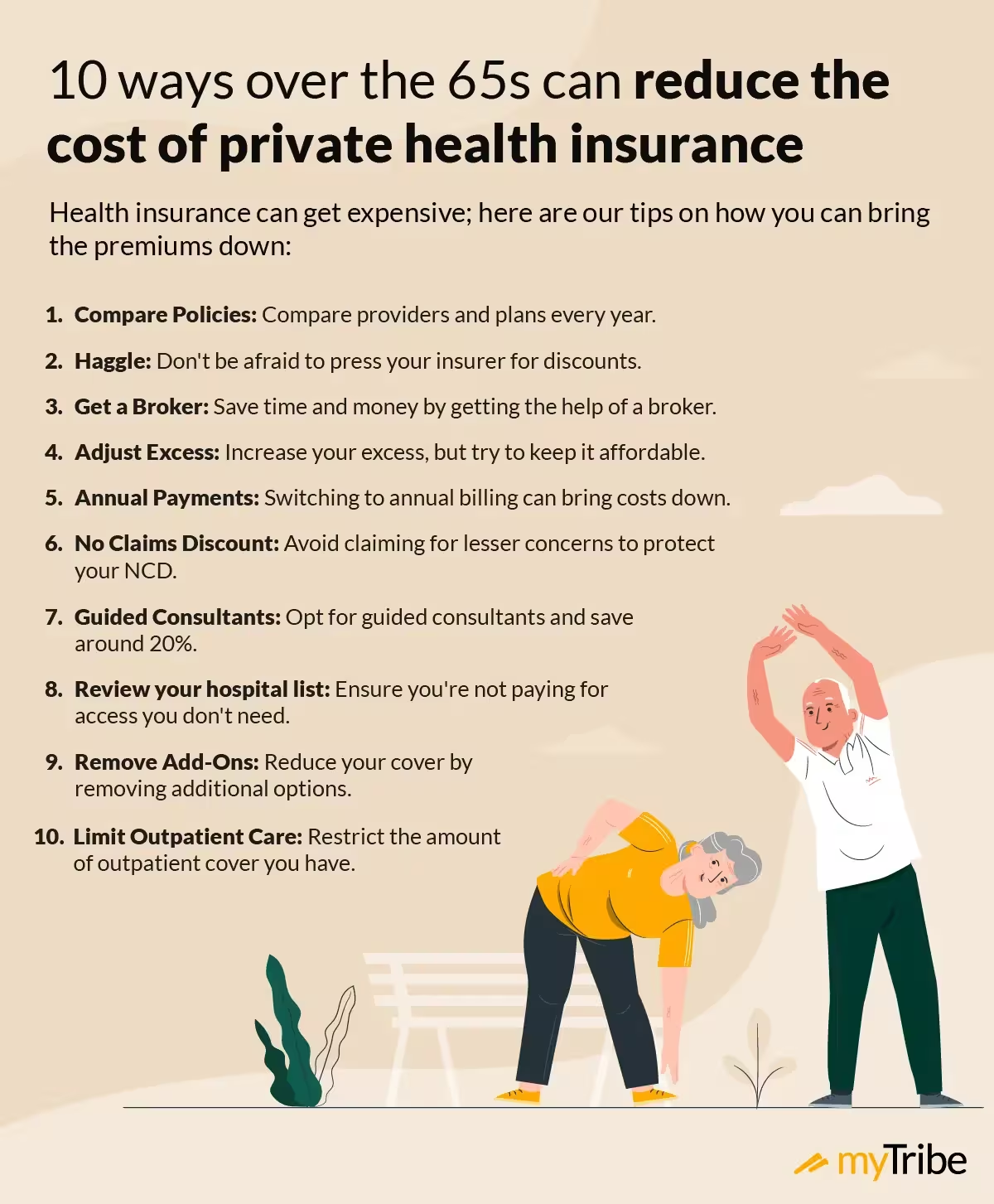How over 65s can reduce the cost of private health insurance
Private health insurance can help you access medical treatment and a range of other therapies as and when you need it. But as you get older, policy premiums are likely to rise, making it an increasingly expensive option. Here, we summarise why premiums increase with age and offer some practical tips to help keep private medical insurance affordable.


Why premiums increase with age
Sadly, as we age, we’re more likely to experience a range of health conditions including arthritis, osteoporosis (brittle bones), diabetes, hearing loss and a decline in eye health. Frailty is also a significant risk, with 30% of 65-year-olds suffering a fall at least once a year. Around 5% of falls result in a fracture, needing hospital treatment.
With that in mind, the older we get, the more likely we are to make a claim on our health insurance policies, which is reflected in the higher cost of premiums.
Related guide:
Why it's always wise to compare before you buy
Buying directly from an insurer may seem simpler, but there are downsides you should be aware of. Their online quote systems rarely show all available plan options, and if you speak with them, they can only tell you about their own products, not advise you based on your situation.
An experienced broker can show you the full picture and help you find the right cover at the best price.
When you compare through myTribe, we match you with a health insurance broker that is vetted and actively monitored for customer satisfaction, speed and reliability of communications, and knowledge, so you get a genuine product expert helping you, not just a sales call. To get a personalised market comparison, please click below, and remember to let us know how you get on.

While we can expect premium increases, it shouldn’t mean being priced out of private health insurance – here’s what you can do to keep your policy affordable:
1. Compare plans
As with almost all types of insurance, you should compare policies every time your current plan needs renewing. Even if you’re generally happy with the cover you have, there may be newer packages that include a broader range of treatments.
The only exception is if you’ve had some previous medical concerns that are covered under your current policy or will soon be covered because a moratorium period is coming to an end.
Moratorium periods are when certain (usually pre-existing) conditions are excluded; they typically last two years. If you’ve been symptom-free for that period, your insurer will normally reinstate cover. But taking out a policy with a different insurer could mean you need to start a new moratorium period and wait even longer for a pre-existing condition to be covered.
2. Haggle with your insurer
Haggling might not be something you’re comfortable with but speaking directly to health insurance providers can help shave money off your premium.
A good way to approach this is to compare policies beforehand and find a similar but cheaper plan. This gives you and the insurer a benchmark and lets them know you do actually have an alternative option. More often than not, they’ll take a little off their premium. Ultimately, the worst that can happen is that they say no, so don’t be afraid to haggle.
If you want to renew your premium but can’t quite afford it, tell your health insurer. If you’ve been a policyholder for a while, they may well offer you a deal in order to keep your custom.
3. Get a broker
If you really can’t stomach the idea of haggling, you can hire an insurance broker instead.
A broker will discuss what it is you want in a plan and search the market on your behalf. They’ll also be able to take you through specific features and explain any conditions so you can choose a policy that provides you with good value for money.
4. Increase your excess
Excess is an amount of money you pay towards a claim. For example, if you make a claim valued at £700 and your excess is £200, you would pay £200, and your insurer would cover the remaining £500.
Increasing the excess lowers your overall premium, making your policy more affordable. On the other hand, it does mean that you’ll pay more when you claim.
If you decide to increase your excess, remember to make it affordable because you won’t be able to proceed with a claim if you don’t pay it.
5. Pay for your health insurance annually
Some insurers will offer you a discount if you pay your premium annually rather than in monthly instalments. Discounts will vary but expect around 5%-6%.
If it’s not immediately obvious whether you get a discount for paying annually, speak to the insurer directly. In most cases, you’ll be pleasantly surprised.
6. Build up a no-claims bonus
Some health insurers will offer you a no-claims bonus. This means that you’ll get a discount at renewal as long as you haven’t made a claim (discounts vary by insurer).
However, building up a no-claims bonus doesn’t mean you should avoid claiming for treatment. Instead, weigh up the cost of treatment versus your excess to see if it’s worth claiming or paying for the treatment yourself.
7. Select the guided consultant option
You may be given the option of a guided consultant list which means your health insurer will give you a shortlist of consultants to choose from. The list you’re given will always reflect your condition and the treatment you need so you’ll be choosing from specialists in their field.
Some health insurers offer more choice than others so a guided consultant list with one provider might still be extensive, while others might list two or three.
Guided consultant lists can help reduce your premium by as much as 20% in some cases so it’s an option worth considering if you need to stick to a budget.
The alternative (more expensive option) is an unrestricted consultant list where you can choose a specialist yourself.
8. Limit your hospital network
Your health insurance provider will work with a network of hospitals – the more they work with, the more choice you have in terms of where you’re treated. More choice, however, means more expense, so limiting which hospitals you can be treated at, helps reduce your premium.
Being selective about hospitals doesn’t mean culling all your options, it could simply mean limiting the list to networks in your region (rather than being able to choose nationally). Realistically, this is a relatively easy way to save money on your premium as most people want to be treated close to home.
The amount you can save will depend on where you live and how much it costs to maintain and run a hospital in your area. Unfortunately, if you live in a high cost of living area (such as a big city or in the southeast of England), you’re likely to pay more compared to someone in a less affluent area. That said, if you’re able to remove high-end hospitals (in central London for example) you could still save money.
9. Avoid add-ons and cash benefits you don’t need
Optional extras can give you greater access to a range of healthcare and wellbeing services, but they also increase what you pay. To keep your premium down, stick to the core or essential cover you need and avoid adding features such as cash benefits for dental, optical and hearing care.
While these features can help cover some of the cost of glasses, contact lenses or hearing aids, if you’re unlikely to claim, it’s probably not worth the additional premium increase.
10. Keep the NHS treatment option
Health insurers usually offer a ‘six-week wait’ option which can help lower your premium. It means that if you can be treated by the NHS within six weeks, you’ll receive treatment from them. If that’s not possible, you would then be able to access treatment privately.
11. Limit outpatient treatment
This generally refers to treatment that doesn’t require an overnight stay in hospital. It can include diagnostic tests, consultant appointments and minor surgery.
Health insurance packages will usually offer various ways of limiting your outpatient options. For example, it could mean having any diagnostic tests through the NHS or limiting the number of private consultancy appointments you can have.
Alternatively, some insurers limit outpatient treatment by value. For instance, you’ll be able to access up to £1,500 worth of treatments privately, but then if you needed anything else, you’d either have to pay for it yourself or be treated by the NHS.
12. Maintain good health
When health insurance providers calculate your premium, they’ll take a range of factors into account, including your overall health.
An unhealthy lifestyle (drinking alcohol excessively, being overweight and taking no exercise) can all increase what you pay because you’re at greater risk of becoming ill and making a claim.
In contrast, maintaining a healthy lifestyle (and in turn good health) can help lower your premium. Some insurers also offer incentives to help you stay fit and active with gym discounts.
13. Give up smoking
If you smoke, it can mean you pay as much as 50% more for health insurance compared to a non-smoker. This is simply because smoking increases the risk of you becoming seriously ill.
According to the NHS, not only does smoking cause 70% of lung cancer cases but it increases the risk of other cancers too. Smoking also increases the probability of coronary heart disease, a heart attack or a stroke.
So, while giving up smoking is easier said than done, it can really help lower your health insurance premium (and genuinely improve your health in the long-term).
14. Add family members
If you’re part of a couple, adding your partner to your policy can help reduce what you both pay overall. Typically, you can expect to pay less for a joint policy compared to having a policy each.

Whether or not private health insurance is right for you comes down to your circumstances, no matter what your age.
Before you start your search, consider the type of cover you want, followed by what’s ‘nice to have’. Having a clear list can help you be more mindful about the type of policy you need and stop you being distracted by optional extras that increase your premium.
Private health insurance should provide you with clear benefits that enable you to manage your health and feel in control over your options; pros and cons include:
If you don’t want to rely on the NHS entirely but want to consider other options to private health insurance, you could self-insure instead. This would mean setting aside money to create your own health insurance fund (for example, in an ISA or high interest saving account).
Bear in mind that self-insuring usually means saving for some time or having enough put by to start with. Thanks to the NHS, few of us realise just how much common medical procedures cost, for example (average costs based on our research):
- Knee replacement, £15,138
- Hip replacement, £14,412
- Hysterectomy, £8,795
- Gall bladder removal, £6,696
- Tonsillectomy, £3,130
When you compare policies, be clear about what is and isn’t covered. Remember to take note of any particular limits or conditions that affect your eligibility for treatment too.
Moreover, don’t feel rushed or pressured into making a decision as soon as you receive a quote. If you buy a policy, you have at least 14 days to change your mind (this is the minimum by law, some providers will offer you more time). You should get a refund minus an amount for the days the policy was active).
If you’d prefer to speak to an expert, contact us and we can put you in touch with a regulated broker. They’ll be able to discuss your needs and help take you through all the options available, including looking at ways to keep premiums affordable.
You can also find out more about private health insurance from our in-depth guides:
What our readers say
We are rated Excellent on Google from 150+ reviews. Our reviews relate to the service provided by both myTribe and its partners.
Disclaimer: This information is general, and what is best for you will depend on your personal circumstances. Please speak with a financial adviser or do your own research before making a decision. The brokers we work with provide a comparison service from a panel of some of the UK’s top health insurers. Not every broker works with all the insurers listed in our guides.









